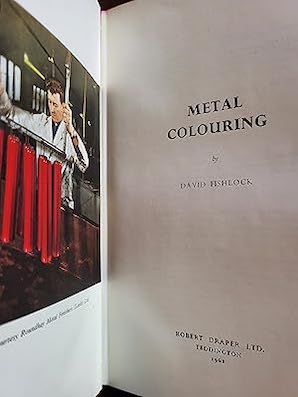
-----
Black chrome plating using ionic liquids
Q. I am intending to plate black chrome on copper. Please can you tell me the main parameters that must be controlled in plating black chrome onto copper using ionic liquids. I have heard the water content of the solution is critical - is that so?
David John ButlerElectronics, vacuum physics. - Chelmsford, UK
2006
A. Proprietary black chrome plating solutions are available and will come with tech data sheets telling you what to analyze for, David. If plating black chrome is what you're trying to do, rather than experimenting with ionic liquids, that's the easiest way to go. Good luck.

Ted Mooney, P.E.
Striving to live Aloha
finishing.com - Pine Beach, New Jersey
Ted is available for instant help
or longer-term assistance.
2006
2006
A. Black chrome solution:
Chromic acid.......250 gm
Hydrofluosilicic acid....0,25 gm
water ......................1 lit
27-30 °C temp., 150-450 A/sq.ft, 6 V
or
250-400 chromic acid
5 ml acetic or propionic acid
800 A/sq.ft, 25 °C temp.
According to Fishlock: Metal Colouring, Teddington 1962.
Good luck and hope it helps!
- Cerovski vrh Croatia
A. Why are you wanting to use ionic liquids? Isn't conventional chromium plating adequate for you? If there is a reason, check out the literature; ionic liquids in electroplating is a relatively new idea and has only really been around for a decade or so. For a starter, look for publications by Andrew Abbott at Leicester University. One electrolyte I know of is choline chloride and I believe this gives a black chrome deposit. The addition of urea is also useful in reducing the melting point of the system.

Trevor Crichton
R&D practical scientist
Chesham, Bucks, UK
2006
A. I agree with Trevor Crichton. Use of ionic liquids in the electrodeposition of metals and semiconductors is a novel approach.
Since you are interested in black chrome plating, you might refer the following article by Abbott et al.,
Electrodeposition of chromium black from ionic liquids, Transactions of the Institute of Metal Finishing, Volume 82, Issue 1-2, January 2004, Pages 14-17

T.S.N. Sankara Narayanan
- Chennai, Tamilnadu, India
(ed.note: The good doctor offers a fascinating blog, "Advancement in Science" )
2006
A. Ionic liquids are a new and novel approach to electroplating. At present, depositing black chrome is much easier to do than reflective chrome finishes.
Depending on the generation of Ionic Liquids use - water is VERY detrimental to the usability of liquid. 1st generation requires water concentration to be less that 5ppm in an inert environment. 2nd and 3rd generation liquids are more moisture tolerant.
If you are looking for black deposits I would stick with aqueous electroplating unless you have a specific desire to use ionic liquids.
- Cranfield, UK
2007
Q, A, or Comment on THIS thread -or- Start a NEW Thread
